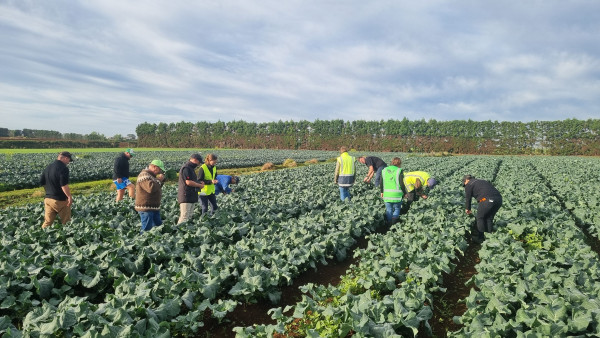Latest workshop series shows IPM can drop insecticide costs by up to $50 a hectare
16 January 2025

By Vegetables NZ research, development and extension manager, Daniel Sutton
The latest workshop series on integrated pest management (IPM) in Pukekohe has shown that IPM can reduce insecticide costs by up to $50 a hectare.
The workshops ran from mid-October through early December. During this time, the A Lighter Touch (ALT) demonstration farm in Pukekohe hosted broccoli, onion and barley crops. The workshops involved input from Vegetables NZ, Onions NZ and the Foundation for Arable Research (FAR). This allowed attendees to learn and engage with multiple crops, experts, and control strategies.
Format
The workshops ran each week, over eight weeks. They each included a field and a classroom session. In the field, attendees would scout crops, identify pests, diseases, and beneficial arthropods and note any other relevant information in the crop.
In the classroom, attendees worked their way through a process to decide how the crop should be managed. Factors to be considered included pest numbers, stage of the crop, trends from the previous week, etc.
Attendees would then discuss whether intervention was required, and if so, what kind of intervention. For example, was beneficial arthropod activity maintaining control of insect pests? Was a soft biological insecticide required or was a synthetic insecticide needed? What would give the required protection to the crop, while minimising the impact to beneficials and the wider environment?
‘Marketable standard’ attained using IPM
The broccoli crop, which was the focus for the workshops, did well. The final crop reached a marketable standard with fewer synthetic insecticide inputs than the commercial comparison. Both crops (workshop and commercial) received an application of an insecticide drench before planting, and an indoxacarb insecticide application before harvest. However, the workshop crop received two applications of a biological insecticide, while the commercial comparison received two applications of a synthetic insecticide.
Overall, insecticide costs in the workshop crop were approximately $50 less per hectare.
Third successful workshop series
The spring 2024 workshop series was the third held at the ALT demonstration farm in Pukekohe. The previous two series were spring lettuce workshops in 2023, and summer broccoli workshops in 2024.
Attendance remained strong, with an average of 30 people attending each workshop each week. Again, this was a combination of in-person and on-line attendance. Feedback also continues to be positive, with 90% of participants rating the series a four or five out of five.
Key takeaways
- Insecticide use could be significantly reduced and still produce a marketable crop
- Gaining a better understanding from growers of their approaches/needs, as well as how biologicals can fit into an IPM strategy to benefit both growers and end consumers
- Reducing the number of broad-spectrum sprays through crop monitoring and the use of selective biological insecticides encourages beneficial predators and improves biodiversity in the paddock, without negatively affecting the crop.
The latest series of workshops was the first to feature a mix of different crop types, compared to individual crops in previous workshops. This was well received by attendees with 80% of feedback stating it was good to have the mix, with a further 20% stating there needs to be more of a focus on including other crops.
As attendees registered for the event, they were asked to rate their understanding of IPM. On registration, attendees averaged a score of some knowledge (3/5). After the workshops, attendees, on average, rated moderate knowledge (4/5), which shows attendees have taken key information with them.
Feedback
Feedback from the event included:
- ‘This was one of the best workshops I've attended, as it included diverse crops and helped me understand neighbouring practices to enhance our IPM control’
- ‘Great to have time to review alternatives and different ways of approaching crop pest and diseases’
- ‘Very informative and interactive learning’.
There was a clear desire from the attendees to dive deeper into wider aspects of crop production. In particular, soil health and how, when the soil thrives, crops do well, and are more resilient to pests and diseases. This will be investigated for future events.
What’s next
The IPM workshops are taking a break over the summer due to other extension events happening, including the Vegetable Big Day Out on 3 and 4 February, in Pukekohe. Register here if you haven’t already.
Thanks to
The IPM workshops would not be possible without the support of multiple people and organisations:
- FAR and Onions NZ for bringing in their expertise for their crops
- Olivia Prouse (Cropping Services Ltd) for her knowledge and expertise in the broccoli crop
- Howe Young from Balles Bros and Scott Fong from Desloe Produce for growing and managing their crops
- Molly Green from Horticentre, Pukekohe who helped facilitate several of the workshops.
